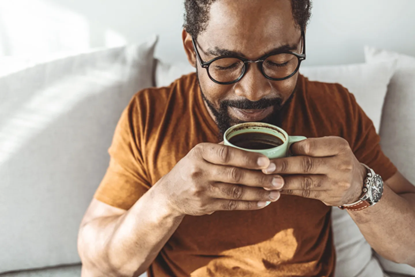
至少在美國(guó),,咖啡是早晨生活的必備品,。根據(jù)美國(guó)國(guó)家咖啡協(xié)會(huì)(NCA)的數(shù)據(jù),過(guò)去一天內(nèi)曾飲用過(guò)咖啡的美國(guó)成年人數(shù)量達(dá)到了20多年來(lái)的最高水平,,而且大多數(shù)飲用咖啡的成年人(81%)會(huì)在早餐時(shí)享用一杯咖啡,。不過(guò),,也有一些人會(huì)等到休息時(shí)間再喝咖啡——根據(jù)美國(guó)國(guó)家咖啡協(xié)會(huì)的數(shù)據(jù),19%的美國(guó)成年人會(huì)在下午喝咖啡,,10%的成年人會(huì)在晚上喝咖啡。
但是,,是否存在一天之中飲用咖啡的最佳時(shí)段,,以便我們從中獲取最大的益處呢?
最新研究為早晨喝咖啡提供了有力依據(jù),,表明喝咖啡的具體時(shí)間或許會(huì)對(duì)人的壽命產(chǎn)生影響,。在發(fā)表于《歐洲心臟雜志》(European Heart Journal)的一項(xiàng)研究中,研究人員觀察了兩種喝咖啡的時(shí)間模式:早上喝咖啡的人和全天喝咖啡的人,。在對(duì)其他潛在因素進(jìn)行調(diào)整后,,研究人員發(fā)現(xiàn),與不喝咖啡的人相比,,早上喝咖啡的人在研究期間死于任何原因的可能性降低了16%,死于心血管疾病的風(fēng)險(xiǎn)降低了31%,。然而,,與不喝咖啡的人相比,全天喝咖啡的人并沒(méi)有降低風(fēng)險(xiǎn),。
作者推測(cè),,下午晚些時(shí)候飲用含咖啡因的咖啡可能會(huì)擾亂晝夜節(jié)律和褪黑素水平,從而導(dǎo)致炎癥和睡眠障礙,。另一種可能的解釋是,,人體內(nèi)的炎癥水平往往在早晨時(shí)分達(dá)到峰值,而咖啡所具有的天然抗炎特性,,使得在一天中較早的時(shí)候飲用咖啡能夠產(chǎn)生更為顯著的效果,。
當(dāng)然,許多人早上喝咖啡主要是看重其含有的咖啡因,,其效果會(huì)在飲用后約30分鐘到1小時(shí)內(nèi)顯現(xiàn),,這取決于個(gè)人的遺傳基因以及是否進(jìn)食。對(duì)一些人來(lái)說(shuō),,飲用后10到15分鐘就會(huì)起效,,而對(duì)另一些人來(lái)說(shuō),則可能需要兩三個(gè)小時(shí),。
據(jù)克利夫蘭診所(Cleveland Clinic)稱,,盡管存在自然差異,但專家表示,,上午9點(diǎn)半到11點(diǎn)這一時(shí)間段可能是喝咖啡的最佳時(shí)間,。
不過(guò),,關(guān)于飲用咖啡的時(shí)間,仍需考慮一些關(guān)鍵因素,。
記住你的生物鐘
咖啡因效果的強(qiáng)弱可能取決于你攝入的時(shí)間,,這是因?yàn)槿梭w的晝夜節(jié)律,即生物鐘會(huì)發(fā)出何時(shí)入睡和何時(shí)醒來(lái)的信號(hào),??死蛱m診所人類營(yíng)養(yǎng)中心的注冊(cè)營(yíng)養(yǎng)師朱莉婭·祖姆帕諾(Julia Zumpano)表示,人體內(nèi)的皮質(zhì)醇(一種有助于維持清醒狀態(tài)的壓力激素)在起床后約30至45分鐘會(huì)上升,。
如果你早上起床后的第一件事就是喝咖啡,,可能會(huì)有更強(qiáng)烈的反應(yīng),因?yàn)榭Х人鶐?lái)的提神效果會(huì)與身體自然的清醒機(jī)制相互疊加,。雖然有些人可能需要額外的刺激,,但另一些人可能會(huì)因咖啡對(duì)神經(jīng)系統(tǒng)產(chǎn)生的興奮作用(這種作用會(huì)抑制化學(xué)物質(zhì)腺苷的釋放)而感到一些令人不適的副作用,比如顫抖,、心跳加速和頭暈,。
祖姆帕諾說(shuō):“每個(gè)人都有過(guò)這樣的經(jīng)歷,眼睛都凸出來(lái)了,、渾身發(fā)抖,、注意力不集中。這些反應(yīng)會(huì)加劇焦慮情緒,。理想情況下,,如果能在醒來(lái)后的一到兩小時(shí),也就是皮質(zhì)醇水平上升后又開始回落時(shí)再喝咖啡,,效果最佳,。”這也與休伯曼的方法一致,,也可能有助于將清醒狀態(tài)延長(zhǎng)到下午早些時(shí)候,,避免出現(xiàn)令人不悅的午后困倦。
如果您無(wú)法等到上午十點(diǎn)左右再喝咖啡,,或者并不介意早上一醒來(lái)就喝咖啡帶來(lái)的影響,,那么無(wú)需擔(dān)心。目前有限的研究表明,,延遲攝入咖啡因?qū)γ總€(gè)人來(lái)說(shuō)都是理想的選擇,。
對(duì)于那些需要在鬧鐘響后立即沖泡咖啡的人,祖姆帕諾也給出了一些有助于減少潛在副作用的建議,。例如,,慢慢地啜飲咖啡而不是大口吞咽,或在進(jìn)餐時(shí)飲用,,這樣可以減緩血液對(duì)咖啡因的吸收,。加一點(diǎn)牛奶也能抵消部分影響,。盡管如此,專家還是提醒避免加入人工甜味劑和添加糖,,因?yàn)樗鼈儠?huì)導(dǎo)致血糖升高,,增加患糖尿病和肥胖癥的風(fēng)險(xiǎn)。
晨練
研究表明,,咖啡可以改善運(yùn)動(dòng)表現(xiàn),。一項(xiàng)對(duì)46項(xiàng)研究的分析發(fā)現(xiàn),適量攝入咖啡因能提高耐力,。祖姆帕諾說(shuō),,如果早晨起來(lái)快速喝一杯咖啡能讓你在健身房里精力充沛,那就堅(jiān)持使用這個(gè)方法,。
對(duì)于那些傾向于在一天的晚些時(shí)候鍛煉,,但仍希望獲得額外清醒感的人,祖姆帕諾建議飲用其他濃度較低的含咖啡因飲品,,比如綠茶,,這樣不會(huì)對(duì)睡眠造成不良影響。
給自己設(shè)定一個(gè)界限
充足的睡眠對(duì)維護(hù)身心健康至關(guān)重要,,它能讓人的大腦和身體得到恢復(fù),,從而抵御疾病??Х纫驎?huì)擾亂睡眠,尤其是在臨近就寢時(shí)間攝入的情況下,。祖姆帕諾說(shuō):“它或許會(huì)在你毫不知情的情況下,,于半夜時(shí)分影響你的睡眠?!?咖啡因在人體血液中停留的時(shí)間最長(zhǎng)可達(dá)8小時(shí),。專家建議睡前6到8小時(shí)應(yīng)避免飲用咖啡。例如,,如果你的就寢時(shí)間是晚上9點(diǎn),,那么最后一杯咖啡就不應(yīng)晚于下午3點(diǎn)飲用。
祖姆帕諾說(shuō):“對(duì)于許多人而言,,找到理最適宜的咖啡因攝入量需要反復(fù)試驗(yàn),。這完全取決于你期望從咖啡因攝入中獲得怎樣的效果?!保ㄘ?cái)富中文網(wǎng))
譯者:中慧言-王芳
至少在美國(guó),,咖啡是早晨生活的必備品。根據(jù)美國(guó)國(guó)家咖啡協(xié)會(huì)(NCA)的數(shù)據(jù),,過(guò)去一天內(nèi)曾飲用過(guò)咖啡的美國(guó)成年人數(shù)量達(dá)到了20多年來(lái)的最高水平,,而且大多數(shù)飲用咖啡的成年人(81%)會(huì)在早餐時(shí)享用一杯咖啡,。不過(guò),也有一些人會(huì)等到休息時(shí)間再喝咖啡——根據(jù)美國(guó)國(guó)家咖啡協(xié)會(huì)的數(shù)據(jù),,19%的美國(guó)成年人會(huì)在下午喝咖啡,,10%的成年人會(huì)在晚上喝咖啡。
但是,,是否存在一天之中飲用咖啡的最佳時(shí)段,,以便我們從中獲取最大的益處呢?
最新研究為早晨喝咖啡提供了有力依據(jù),,表明喝咖啡的具體時(shí)間或許會(huì)對(duì)人的壽命產(chǎn)生影響,。在發(fā)表于《歐洲心臟雜志》(European Heart Journal)的一項(xiàng)研究中,研究人員觀察了兩種喝咖啡的時(shí)間模式:早上喝咖啡的人和全天喝咖啡的人,。在對(duì)其他潛在因素進(jìn)行調(diào)整后,,研究人員發(fā)現(xiàn),與不喝咖啡的人相比,,早上喝咖啡的人在研究期間死于任何原因的可能性降低了16%,,死于心血管疾病的風(fēng)險(xiǎn)降低了31%。然而,,與不喝咖啡的人相比,,全天喝咖啡的人并沒(méi)有降低風(fēng)險(xiǎn)。
作者推測(cè),,下午晚些時(shí)候飲用含咖啡因的咖啡可能會(huì)擾亂晝夜節(jié)律和褪黑素水平,,從而導(dǎo)致炎癥和睡眠障礙。另一種可能的解釋是,,人體內(nèi)的炎癥水平往往在早晨時(shí)分達(dá)到峰值,,而咖啡所具有的天然抗炎特性,使得在一天中較早的時(shí)候飲用咖啡能夠產(chǎn)生更為顯著的效果,。
當(dāng)然,,許多人早上喝咖啡主要是看重其含有的咖啡因,其效果會(huì)在飲用后約30分鐘到1小時(shí)內(nèi)顯現(xiàn),,這取決于個(gè)人的遺傳基因以及是否進(jìn)食,。對(duì)一些人來(lái)說(shuō),飲用后10到15分鐘就會(huì)起效,,而對(duì)另一些人來(lái)說(shuō),,則可能需要兩三個(gè)小時(shí)。
據(jù)克利夫蘭診所(Cleveland Clinic)稱,,盡管存在自然差異,,但專家表示,上午9點(diǎn)半到11點(diǎn)這一時(shí)間段可能是喝咖啡的最佳時(shí)間。
不過(guò),,關(guān)于飲用咖啡的時(shí)間,,仍需考慮一些關(guān)鍵因素。
記住你的生物鐘
咖啡因效果的強(qiáng)弱可能取決于你攝入的時(shí)間,,這是因?yàn)槿梭w的晝夜節(jié)律,,即生物鐘會(huì)發(fā)出何時(shí)入睡和何時(shí)醒來(lái)的信號(hào)??死蛱m診所人類營(yíng)養(yǎng)中心的注冊(cè)營(yíng)養(yǎng)師朱莉婭·祖姆帕諾(Julia Zumpano)表示,,人體內(nèi)的皮質(zhì)醇(一種有助于維持清醒狀態(tài)的壓力激素)在起床后約30至45分鐘會(huì)上升。
如果你早上起床后的第一件事就是喝咖啡,,可能會(huì)有更強(qiáng)烈的反應(yīng),,因?yàn)榭Х人鶐?lái)的提神效果會(huì)與身體自然的清醒機(jī)制相互疊加。雖然有些人可能需要額外的刺激,,但另一些人可能會(huì)因咖啡對(duì)神經(jīng)系統(tǒng)產(chǎn)生的興奮作用(這種作用會(huì)抑制化學(xué)物質(zhì)腺苷的釋放)而感到一些令人不適的副作用,,比如顫抖、心跳加速和頭暈,。
祖姆帕諾說(shuō):“每個(gè)人都有過(guò)這樣的經(jīng)歷,,眼睛都凸出來(lái)了、渾身發(fā)抖,、注意力不集中,。這些反應(yīng)會(huì)加劇焦慮情緒。理想情況下,,如果能在醒來(lái)后的一到兩小時(shí),,也就是皮質(zhì)醇水平上升后又開始回落時(shí)再喝咖啡,效果最佳,?!边@也與休伯曼的方法一致,也可能有助于將清醒狀態(tài)延長(zhǎng)到下午早些時(shí)候,,避免出現(xiàn)令人不悅的午后困倦。
如果您無(wú)法等到上午十點(diǎn)左右再喝咖啡,,或者并不介意早上一醒來(lái)就喝咖啡帶來(lái)的影響,,那么無(wú)需擔(dān)心。目前有限的研究表明,,延遲攝入咖啡因?qū)γ總€(gè)人來(lái)說(shuō)都是理想的選擇,。
對(duì)于那些需要在鬧鐘響后立即沖泡咖啡的人,祖姆帕諾也給出了一些有助于減少潛在副作用的建議,。例如,,慢慢地啜飲咖啡而不是大口吞咽,或在進(jìn)餐時(shí)飲用,,這樣可以減緩血液對(duì)咖啡因的吸收,。加一點(diǎn)牛奶也能抵消部分影響,。盡管如此,專家還是提醒避免加入人工甜味劑和添加糖,,因?yàn)樗鼈儠?huì)導(dǎo)致血糖升高,,增加患糖尿病和肥胖癥的風(fēng)險(xiǎn)。
晨練
研究表明,,咖啡可以改善運(yùn)動(dòng)表現(xiàn),。一項(xiàng)對(duì)46項(xiàng)研究的分析發(fā)現(xiàn),適量攝入咖啡因能提高耐力,。祖姆帕諾說(shuō),,如果早晨起來(lái)快速喝一杯咖啡能讓你在健身房里精力充沛,那就堅(jiān)持使用這個(gè)方法,。
對(duì)于那些傾向于在一天的晚些時(shí)候鍛煉,,但仍希望獲得額外清醒感的人,祖姆帕諾建議飲用其他濃度較低的含咖啡因飲品,,比如綠茶,,這樣不會(huì)對(duì)睡眠造成不良影響。
給自己設(shè)定一個(gè)界限
充足的睡眠對(duì)維護(hù)身心健康至關(guān)重要,,它能讓人的大腦和身體得到恢復(fù),,從而抵御疾病??Х纫驎?huì)擾亂睡眠,,尤其是在臨近就寢時(shí)間攝入的情況下。祖姆帕諾說(shuō):“它或許會(huì)在你毫不知情的情況下,,于半夜時(shí)分影響你的睡眠,。” 咖啡因在人體血液中停留的時(shí)間最長(zhǎng)可達(dá)8小時(shí),。專家建議睡前6到8小時(shí)應(yīng)避免飲用咖啡,。例如,如果你的就寢時(shí)間是晚上9點(diǎn),,那么最后一杯咖啡就不應(yīng)晚于下午3點(diǎn)飲用,。
祖姆帕諾說(shuō):“對(duì)于許多人而言,找到理最適宜的咖啡因攝入量需要反復(fù)試驗(yàn),。這完全取決于你期望從咖啡因攝入中獲得怎樣的效果,。”(財(cái)富中文網(wǎng))
譯者:中慧言-王芳
A cup of coffee is the quintessential staple of a morning routine—at least in the U.S. The number of American adults who said they had coffee in the past day has reached its highest level in more than 20 years, according to the National Coffee Association (NCA)—and the majority of coffee-drinking adults (81%) have their cup of joe with breakfast. Still, others wait until they’ve settled into their day to drink java—19% of U.S. adults enjoy coffee in the afternoon, and 10% in the evening, according to the NCA.
But Is there a best time to drink coffee for maximum benefits?
New research makes a strong case for morning joe, indicating that the timing may impact your longevity. In a study published in the European Heart Journal, researchers looked at two patterns of coffee timing: people who drank their coffee in the morning, and people who were all-day drinkers. After adjusting for other potential factors, researchers found that morning coffee drinkers were 16% less likely to die of any cause during the study period, and 31% less likely to die of cardiovascular disease, compared to people who didn’t drink coffee. However, there was no reduction in risk for all-day coffee drinkers compared to non-coffee drinkers.
The authors speculate that drinking caffeinated coffee later in the day could disrupt circadian rhythm and melatonin levels, leading to inflammation and sleep disturbances. A second potential explanation is that inflammation is at its highest in the morning, and the natural anti-inflammatory properties of coffee may have a greater impact when consumed earlier in the day.
Of course, the primary reason many reach for a morning cuppa is the caffeine, which kicks in about 30 minutes to an hour after consumption, depending on a person’s genetics, and whether or not they have eaten. For some, the effects appear 10 to 15 minutes after consumption, while it can take a couple of hours for others.
Despite natural variability, experts say that the window of 9:30 a.m. to 11 a.m. may be the best time to consume coffee, according to the Cleveland Clinic.
Still, there are a few key considerations about when you consume coffee.
Remember your body clock
The intensity of caffeine’s effects can depend on the time of day you consume it because of the body’s circadian rhythm, or the natural body clock that signals when it’s time to sleep and rise. The body’s cortisol, known as the stress hormone that aids in helping you feel awake, rises about 30 to 45 minutes after you wake up, says Julia Zumpano, a registered dietitian with the Cleveland Clinic Center for Human Nutrition.
If you consume coffee first thing in the morning, you may have a more intense response because you feel the effects on top of the body’s natural alert response. While some may need that extra push, others may feel some of the coffee’s more unpleasant side effects, like shakiness, an elevated heart rate, and dizziness, due to the stimulant effects on the nervous system, which block the chemical adenosine.
“Everybody has been at that point where their eyes are bugging out of their head, and they are jittery and unfocused,” says Zumpano. “That stimulates levels of anxiety. Ideally, if you could wait one to two hours [after you wake up] and after cortisol levels rise and start to come back down, that would be the best time to have coffee.” This is also aligned with Huberman’s approach and may also help lengthen the feeling of alertness into the early afternoon when many face the dreaded midday slump.
If you cannot wait until mid-morning or don’t feel bothered by the effects of coffee first thing, don’t worry. There’s limited research to suggest that delaying caffeine is ideal for everyone.
For those who need to brew their cup promptly post-alarm, Zumpano also offers certain tips that can help reduce the potential side effects. For example, sipping coffee slowly versus gulping it or drinking it alongside a meal can slow the absorption of caffeine into the bloodstream. Adding a bit of milk can also counter some of the effects. Still, experts say to stay clear of artificial sweeteners and added sugars, which can elevate blood sugar and increase the risk of diabetes and obesity.
The morning workout
Studies have shown that coffee can improve exercise performance. One analysis of 46 studies found moderate caffeine consumption improved endurance. If a quick cup of coffee first thing gives you a boost at the gym, then Zumpano says to stick with what works.
For people who prefer to exercise later in the day but still want that extra feeling of alertness, Zumpano suggests other forms of caffeine that are less concentrated to not interfere with sleep, like green tea.
Give yourself a cutoff
Proper sleep is critical for physical and mental health, allowing people to recover so their brains and bodies can fight off disease. Caffeine can disrupt sleep, especially when taken too close to bedtime. “It could be hitting you in the middle of the night. You just don’t know,” says Zumpano. Caffeine can also take up to eight hours to leave the bloodstream. Experts say to stop coffee six to eight hours before bed. If your bedtime is 9 p.m., for example, your last cup should be no later than 3 p.m.
“For a lot of people, it’s trial and error as to what is ideal,” says Zumpano. “It’s all about what you are looking for out of your caffeine intake.”






